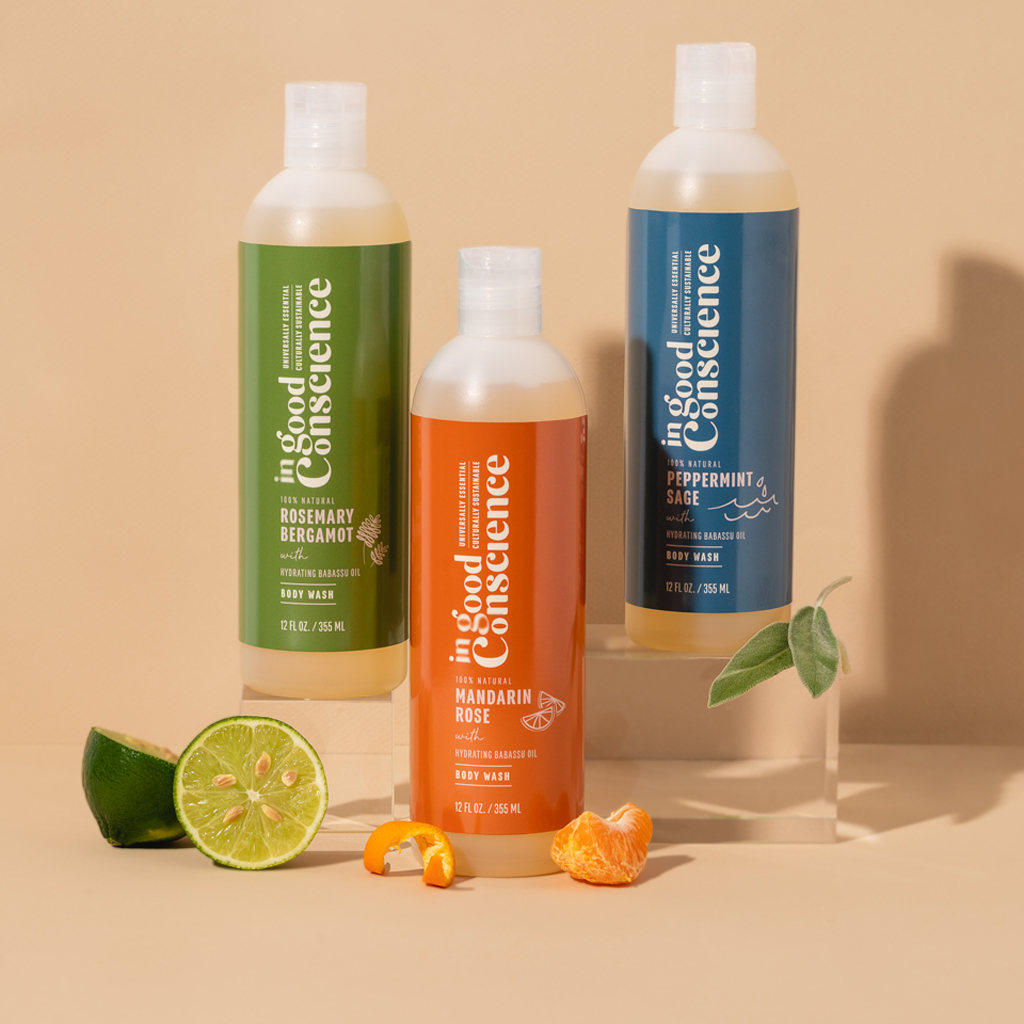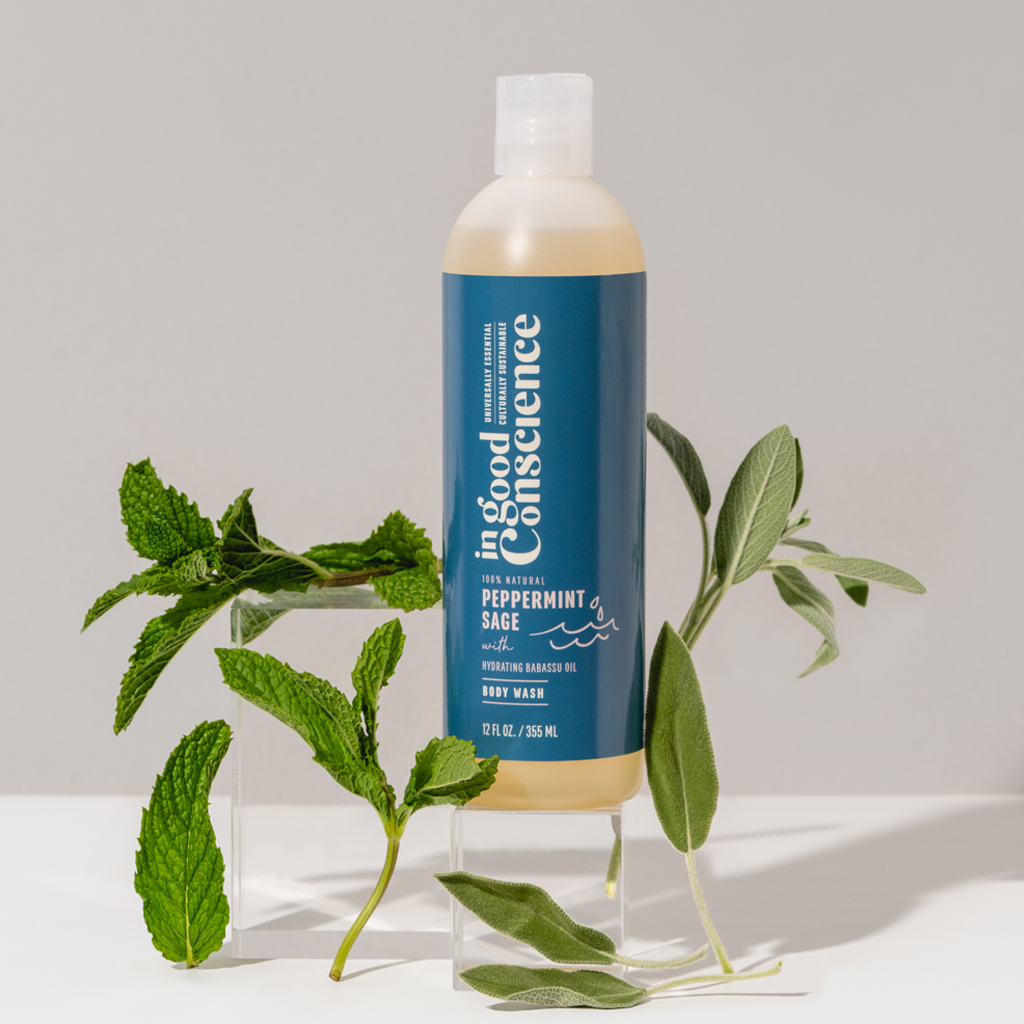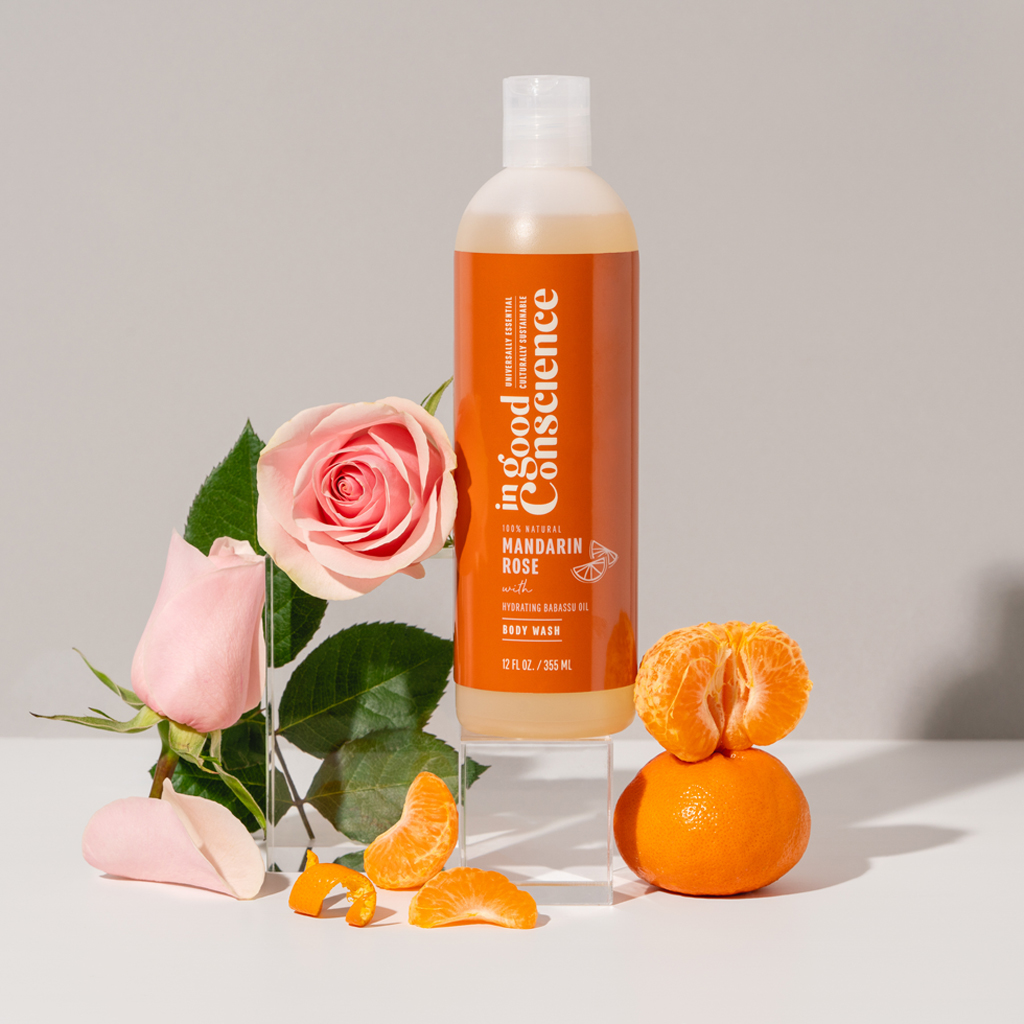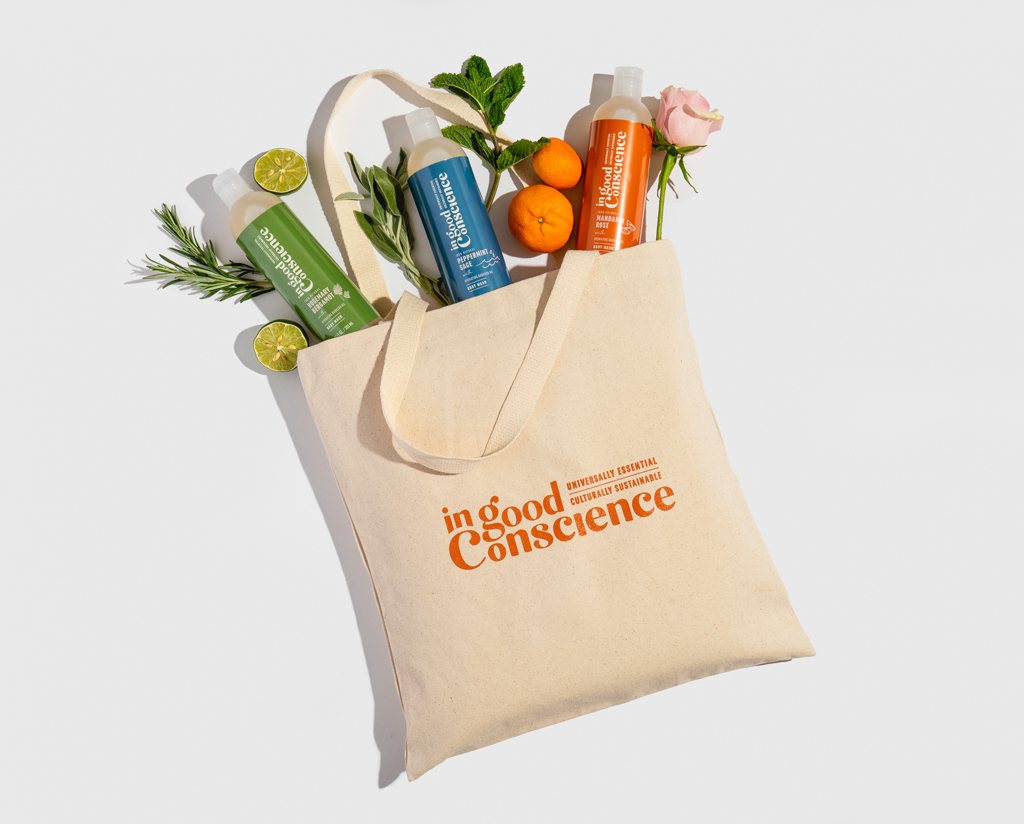In Good Conscience: where beauty meets cultural sustainability
- An interview with brand owner Jerome Clark, by Cole McKisson

“Healthy living doesn’t stop with food and exercise. . .”
Growing up with a nurse for a mom I was always subjected to the cutting edge of the health and wellness scene. Pre-pubescent Cole reluctantly took his organic vitamins, groaned when the vegetables were deliberately undercooked (to preserve the nutrients), and screamed when he wiped Kelly green the morning after having to drink chlorophyll. Trend after trend, study after study, the concern for a long time was just with the things we ingested into our bodies. However, last year when I was back at home during the beginning of the pandemic, my mom put the kibosh on body wash.
The new rule was no more chemical detergents in our soaps. Awareness was shifted. As it turns out, what you put on your body can be just as important as what you put in your body. Science – beautiful as it is – can get ahead of itself sometimes, and way back when scientists discovered powerful chemicals that could destroy germs like Robocop, they didn’t think that the indiscriminate killing of all bacteria could be harmful to, you know, good bacteria.
Misinterpreted-science-blather-from-an-English-major aside, the point is that healthy living doesn’t stop with food and exercise. The cleaning products that you use in your daily lives also have an impact on your general wellbeing, which is why I felt honored to be asked to cover a new line of universally essential personal cleansing products, In Good Conscience.
In Good Conscience creates naturally-derived body washes with a sustainable, minority owned and focused business model. Founded by Jerome Clark, a Tulsa, OK native now living in New York City, the company prides itself on its “cultural sustainability” model which prioritizes Black-, minority-, and women-owned partnerships to sustain cultures throughout the supply chain. The line of bodywashes, intended for use by all genders and nonbinary individuals, includes ingredients like Babassu oil, sustainably-sourced from the Dominican Republic.
While, personally, I’m looking forward to swapping the current products in my shower caddy out for the In Good Conscience line, I can also imagine stuffing a few stockings with the charmingly packaged bottles. Amidst the usual annual craze of gift giving, I’ve been specifically thinking about how to support both small and minority owned businesses – a simple but significant way to continue a fight for justice, about which I care deeply. Sharing these body washes – whether it be the Peppermint Sage scent for the spice-and-herb enthusiasts I know or the Mandarin Rose for those who lean towards fruit and floral fragrances – can allow me to do just that. Not to mention, the company’s ongoing partnership with the Tulsa Dream Center, which works to empower their community, provides even more cause to give back while gift giving.
Recently, I had the opportunity to sit down and talk with Jerome and pick his brain. His passion rang through his confidence and poise and served to inspire me as we chatted about his background, cultural sustainability, and how we can all be consumers ‘in good conscience.’
Related | Black Friday Binges and Holiday Gifting


I’d like to start out getting to know who you are: As you grow your personal and professional footprint with In Good Conscious, how do you want to be seen? What is the impression you want to make on the world?
Through the brand I would want to be seen as an agent of change, in the sense that we’re bringing higher levels of quality to the self-care and personal-care experience for individual consumers, but, also, in the indirect impact that the usage of our products provides to communities that are in need.
What inspires you as a creator and business man?
As a creator I dabble in arts and music. I take my inspiration from other artists, music, culture, food. There’s not many places, other than maybe LA or San Francisco that have the same level of ability to get that inspiration on a day-to-day basis, just by walking to the store and getting a coffee. There’s so much energy and life that is inspiring living in New York City.
In business I come from a marketing background, so really starting with developing brands and a brand’s voice [bringing] that product to life through communications, especially for emerging brands in the digital and e-commerce space, which is a dynamic space to be in these days.
Tell us about the journey of creating In Good Conscience: What sparked the idea and how did you begin the process?
I’ve spent over 12 years of my career in beauty, personal-care, and fragrance for companies like L’Oréal and Revlon and, having that firsthand experience, I always had it in mind at some point that I wanted to start my own brand, but I didn’t really have a strong inspiration that really pushed me to do that until recently. So, as I was tinkering around with a concept for a product in personal care, kind of a socially grounded personal-care concept that was more about universally essential products that could be used by anyone, but with the ability of driving cultural sustainability for marginalized communities. Having participated in some of those protests, it struck me how the concept that I was working on had such a broader reach, considering the diversity of people who were present and in support of a cause that had been catered toward more of the Black community. From there, I really took the concept further and came up with the tagline of universally essential products that could be used by anyone, but with the ability of driving cultural sustainability for marginalized communities that are still grappling with systemic and socio-economic issues.
Universally essential products that could be used by anyone, but with the ability of driving cultural sustainability for marginalized communities.
Why body wash specifically when there are so many beauty industry products to tap into?
Body washes are something you use every day. They’re a product that’s broadly appealing, so with that cultural sustainability mission the goal is to really have a critical mass behind the purchase of the products while capitalizing on the growing trends in clean and natural beauty. And with that scale and critical-mass momentum we will be able to have a bigger impact for our cultural sustainability mission by leading with products that are everyday high frequency usage products.
This is a unisex product, how does this speak to men, women, and other nonbinary individuals?
The products are unisex, I think the color codes, the ingredients have something there for everyone to be clean and be free of harmful ingredients. Based on that foundation it sets the stage for a product line that I think appeals to everyone.
The holidays are coming up, what makes In Good Conscience a perfect gift?
We try to capture that in the name. That’s how we want you to feel about the products when you use [them] for your personal needs. From a conscious standpoint, with every shower that you take, not only are you helping nonprofits that are working in communities of color, but also by our partnerships and our value chain, we’re able to sustain multiple businesses with our partnerships along the product development cycle.
In your company’s press release you have touted your “cultural sustainability” model. Tell me how the model works and how it sustains cultures through just one bottle of IGC.
It starts with ideation, working with brand creatives that are also from the community, and then taking it from there and passing on our formulas that we’ve developed from the concept phase to the contract manufacturers who are also minority owned vendors. Then once the products are developed it’s about using a third-party logistics company that is minority and women led to ship our products for our consumers who are ordering online. We also do our banking with community banks so that all those different touch points are really giving back in that indirect capacity that I mentioned with the model.
Your website explains that the 2020 racial justice protests were the impetus for creating the brand. Was there a particular moment that made you decide to give back in this way?
It was a combination, I would say, of a lot of different factors. I think it was kind of the final straw that took me and crystalized the concept. But it’s more so coming from growing up in communities like the ones that we’re helping utilizing my background in a way that can support a mission that is sustainable, because sometimes with movements they wane over time, but being able to create something that is sustainably built into the business model was kind of the key factors that I pulled from the movement. And just being able to create these products that are broadly appealing that anyone can do and participate in the sustainability of these initiatives by just using the products.
As a protestor myself in Seattle during that time, it was hard for me to watch the movement’s energy collapse as little of the progress that was hoped for came to fruition. How have you reconciled with the way the movement has shifted? And what direct and indirect impacts do you hope to see IGC having on the continuation of the fight for racial justice?
The idea was to really bake it into every aspect of the brand, and, to your point, movements come and go and even for myself, I wanted to be more active in participating in movements and [didn’t] have the time to do so. Some of those limitations we take away from people by just knowing that by using this product you are [they] are participating indirectly and impacting all of these different touchpoints along this racial and justice movement. Above and beyond that there’s a really tangeable personal benefit in using the products from a clean, natural sustainability standpoint that’s also very rewarding and self-fulfilling.

There are a lot of people I see in this movement who criticize Black capitalism as a means of racial progress in favor of total economic revolution. As a Black business owner how would you respond to that?
I still think there’s a place for it and there’s a lot of ground to be made with particularly people of color and Black communities as well in terms of the systemic barriers that have been in place for so long. The progress and the community in terms of business have been hindered or stifled to a degree [and] it’s great that a lot of that is starting to change now, but there’s a lot of road to be made up. I also feel that as it pertains to industries and product categories where Black consumerism sort of over-indexes their share of the population. In this case a very applicable category would be beauty and personal care. The dollars that are spent by people of color outweigh their portion of the population. I think that it creates a strong argument for representation in those particular industries and product categories.
There has been a push for funding, visibility, and support of HBCUs recently. As an HBCU grad, tell us why you made that choice for school? And how has it shaped your worldview?
I went to Clark Atlanta University which is an HBCU located in Atlanta, Georgia. For me, I chose the school because of the history that the school represents and [it] also [having] a very strong business program. The fact that [it is] located in Atlanta, which is a city that has a rich culture in and of itself and represents the best in culture and Black excellence in general, so I just wanted to be a part of that entire vibe, community, and city environment that the HBCU experience provided. So how has that shaped my views since then? Having attended an HBCU it definitely gives you a strong sense of culture and pride. It also gives you a level of confidence that remains quite strong, even throughout your adult life and I’m appreciative of that experience and, having had it at an early age, it’s definitely served me well as I’ve progressed to different cities, companies, jobs, and things of that nature.
Tell me about the Tulsa Dream Center. What’s its mission? And what are your ties to the organization and its causes?
As I was designing the brand and thinking about the give-back portion of the brand, I was very ambitious with trying to address so many different areas. When It [came] to the disparities that I personally witnessed growing up in North Tulsa, OK which is a predominantly African American neighborhood that you can definitely see a difference once you cross a certain railroad track, or however you want to envision it. The north side of Tulsa is definitely a bit more depressed than the south part of town and it happens to be a place where a predominant number of residents are Black. So with knowing that some of the issues that stem from those socioeconomic disparities like healthcare, access to education, [and] financial literacy I was trying to find an organization that could encompass all of those things. In my research the Tulsa Dream Center popped to the top ‘cause they address all of those issues in the very community that I grew up in, and when I had the chance to visit and talk to the director, Tim Newton, at the Dream Center, we had so many connections from other friends, family, [and] church associations that the marriage was just a natural synergy and they were just as excited to partner up with me, as I was with them, as our inaugural nonprofit partner for the business.
As a final note, I’d like to ask you how the readers of this article can help support the causes that IGC supports outside of buying your products.
Sure, I think that just being conscious of how you spend your money in general outside of our brand, being more cognizant of what the brand represents, the ownership structure of the brands that you support. I’m a big fan of the whole concept of shop small for the holiday season because, really, the small businesses add the level of dynamic creativity in terms of products and offerings that a lot of the big companies can’t, and it’s a great way of supporting your local community.




